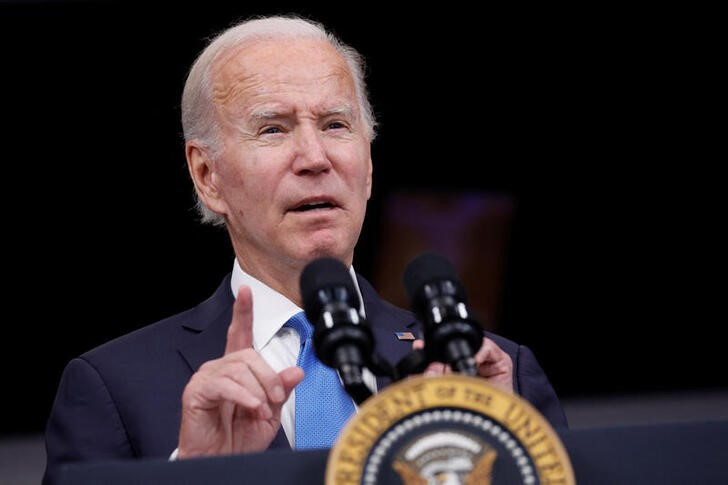
Willie R. Tubbs, FISM News
[elfsight_social_share_buttons id=”1″]
President Joe Biden is nothing if not blissfully, stubbornly, and/or foolishly optimistic about his ability to foster cooperation between Republicans and Democrats, even on legislation that Republicans are all but guaranteed not to back before the House switches hands in January.
As of today, the Biden administration has eight days to pass a government funding bill or face a shutdown. And, with Congress’ Christmas break and the power shift in the lower chamber looming, time is running out for Biden to take advantage of a comparatively easier path to passage for wish-list legislation.
This hasn’t stopped Biden from pushing for an assault weapons ban, resolutely supporting the continuation of COVID vaccine mandates in the military, and angling for additional sundry spending measures.
Nothing the president or Democrats have proposed has gained any traction, though, and now the left is faced with two generally unappealing options. Democrats can either begin making concessions in the hope that Republicans can be enticed to support critical pieces of legislation or they can do nothing and allow the clock to expire on full Democratic control of Congress.
Time to compromise
As the second option is likely worse from their point of view and given that the government funding bill is needed to avoid a shutdown, Democrats are ready to talk compromise.
But the compromise Republicans have offered is likely unwelcome news. Thus far, the only concession GOP lawmakers have offered is to support a temporary measure that would fund the government until January … when a Republican-led House would then be able to shape the final proposal in a manner even more agreeable to the right.
“Time is ticking,” Senate Minority Leader Mitch McConnell (R-Ky.) told Politico. “I think it’s becoming increasingly likely that we may need to do a short-term [continuing resolution] into early next year. We are running out of time and that may be the only option left we can agree to pursue.”
COVID vaccine mandate, Manchin’s permit reform scrapped
Even on an important defense spending bill — one that Republicans cannot, for political and practical reasons, truly block for any meaningful amount of time — Democrats are faced with the proposition of quickly currying favor across the aisle.
In a major concession, one confirmed by a draft resolution released by the House Rules Committee, Democrats have repealed the COVID-19 mandate for the military and also removed language that would have pushed through the fossil fuel permit reform long sought by West Virginia Democratic Sen. Joe Manchin.
The former change was done despite the White House and Department of Defense backing a continued mandate while the latter will further damage the popularity and potential electability of Manchin, who gambled on his political future by backing the unpopular Inflation Reduction Act. However, those concessions mean the 2023 update of the National Defense Authorization Act (NDAA) could be brought to a vote as early as Thursday.
“The COVID vax mandate on our military is ending,” House Minority Leader Kevin McCarthy (R-Calif.), the likely next Speaker of the House, tweeted. “Last week I told Biden directly: it’s time to end your COVID vaccine mandate on our military & rehire our service members. The end of the mandate is a victory for our military & for common sense.”
🚨 BREAKING 🚨 The COVID vax mandate on our military is ending.
Last week I told Biden directly: it’s time to end your COVID vaccine mandate on our military & rehire our service members. The end of the mandate is a victory for our military & for common sense.
My full statement: pic.twitter.com/NedBokdwWm
— Kevin McCarthy (@SpeakerMcCarthy) December 7, 2022
The celebration on the right might be a tad premature. In a political environment in which pro-union Democrats thwart workers’ rights to strike, it’s not beyond the realm of possibility that a mandate is placed back into the final bill. In politics, nothing is done until it is done.
But, given the urgency with which Democrats want to get something, really anything, through Congress in the lame-duck session, it is likely McCarthy’s words prove true.
Biden pushes ‘assault weapons’ ban
It is also highly likely that Biden’s pet projects are doomed at the moment. But this hasn’t stopped the president from telling Americans that he can get something across the line.
He remains optimistic, perhaps obtusely so, that an assault rifle ban can be brought to fruition quickly.
“We did it before,” Biden said at a vigil for gun-violence victims. “We did it, and guess what? It worked … We can do it again.”
Unlike McCarthy, Biden’s optimism is likely ill-placed. No Republican has expressed any interest in supporting such a measure and Democrats, for all of the rhetorical posturing of their farther-left members, have shown no real enthusiasm for pushing such legislation through.
Child tax credit may increase
There could be reason for optimism among Democrats — and in all honesty a lot of American parents — that a more robust child tax credit can be achieved before the break.
Adam Ruben, campaigns director of the progressive advocacy group Economic Security Project, told The Hill that numerous Republican senators — among them Bill Cassidy of Louisiana, Shelley Moore Capito of West Virginia, Lisa Murkowski of Alaska, Susan Collins of Maine, Mitt Romney of Utah, Steve Daines of Montana, and Richard Burr of North Carolina — expressed a willingness to back an expanded credit.
“The numbers add up,” Ruben said. “We think that there’s a sense from a number of Republicans that in the wake of the Dobbs decision, they want to do something that’s more visibly pro-family and they feel like the child tax credit is a way to get that done.”
Even with those seven Republicans on board, a child tax credit measure would still be three votes shy of a filibuster-proof supermajority. But, given the prominence of some of the Republicans apparently on board, there is a real chance those votes could emerge.
